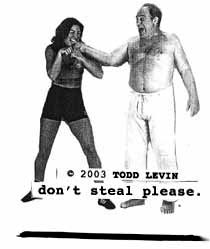


|
|
IN DEFENSE OF FREDDIE PRINZE, JR.
By now anyone who obsessively studies weekend box office returns with nothing personal to gain from the experience knows that the animated film, Delgo, went on record as having the worst opening weekend in the history of American cinema. (According to receipts, it averaged approximately two tickets sold per showtime.) Perhaps the studio was to blame for choosing to open Delgo on over 2,000 screens without spending a single dollar marketing or advertising Delgo beforehand. Or perhaps you could blame this unprecedented bomb on the fact that Delgo was animated by a studio no one has ever heard of, or the fact that the movie deals with racism in some clunky and convoluted way that somehow involves lizard creatures. OR maybe it was simply because the title of this animated film is Delgo. DELGO? That sounds like the title of an obscure and sweet little Italian film about a unique young boy coming of age (i.e. masturbating on or with something crazy, like a piece of knitting or a freshly caught trout) in Sicily during WWII.* I guess my point is, if one were to write an article about Delgo's massive failure on opening weekend, there are a number of angles with which to approach the story. Delgo had a lot going against it, honestly, which makes it very curious that Yahoo! decided this was the best headline to run: FREDDIE PRINZE JR. MOVIE BIGGEST BOMB EVER. I want to say, "way to throw Freddie Prinze Jr. under the bus, Yahoo" -- mostly because I really want to get in on this whole "throwing X under the bus" phenomenon that's been going around lately. However, it might be more accurate to say, "way to leave Freddie Prinze Jr. under the bus where he's been for almost a decade, but then point and shout 'Hey look, it's Freddie Prinze Jr. There, under the bus!' loud enough for everyone to hear, Yahoo!" For all of Delgo's obvious shortcomings, why go after Freddie Prinze Jr? It's not as if Delgo was his personal vanity project. His Postman or Battlefield: Earth or The President of the United States of Meshuggenah. (That is the working title of my vanity project about our country's first Jewish President whose mother comes to live with him in the White House to make him feel ashamed of his bowel movements.) To my knowledge, Delgo was not a Freddie Prinze Jr. vehicle. There were plenty of other actors involved, some of whom do not have the "Prinze Jr. Stink" all over them. Also, it's an animated film, a genre where the voice actors are usually the last thing to blame for the film's failure. I haven't seen Delgo, and maybe Freddie Prinze Jr. insisted on playing his role live action, in which case the blame could fall squarely on his horrible shoulders. But I don't think there is actually a single frame of Delgo in which Freddie Prinze Jr. is recognizable. Which leads me to wonder, Yahoo, how did Freddie Prinze Jr. hurt you? Did he refuse to answer questions from Yahoo at his red carpet premiere of Wing Commander? Maybe he spied that ".com" on your mic, held up his hand dismissively, and told your correspondent, "Sorry, I don't do Web press." Did he bail on a live online chat? Did he refuse to cross-link? WHY ARE YOU SO HURTFUL TOWARD ONE OF OUR NATION'S COMEDIC TREASURE'S SONS? I guess, mostly, I'm just disappointed that Yahoo has lowered itself to the ad hominem attacks that are the mark of so much entertainment journalism these days. Yahoo, I thought you were earnest, like AOL.com and not nasty, like TMZ.com. I thought you were better than this but I have to say, Yahoo, you really let me down -- kind of like Freddie Prinze Jr.'s wooden voice acting work let Delgo down.
|


